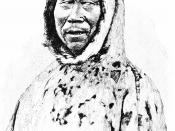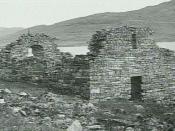Good paper for an upper division Archeaology class Good points. Could have been stronger in use of other disciplines
Review
Buckland, P.C., Amorosi, T., Barlow, L.K., Dugmore, A.J., Mayewski, P.A., McGovern, T.H.,
Ogilvie, A.E.J., Sadler, J.P., Skidmore, P. " Bioarchaeological and Climatological Evidence
for the Fate of Norse Farmers in Medieval Greenland." Antiquity 70.267 (1996): 88-96.
Norse colonization of Greenland, which began in c. AD 985, disappeared within five hundred years. The authors of this study focus on one of the two Norse colonies in Greenland; the "Western Settlement." This settlement is interesting because it has been thought that the adverse climatic conditions in which a group of people must have endured to survive within a agrarian society. The authors point to previous studies that link the demise of the Norse colony with climatological data that indicate the "Little Ice Age" had been a principal contributor the destiny of these farmers.
Buckland, et. al, argue that, while it is clear that their were periods of unusually cool temperatures during the second part of this millennium, they did not happen within the time frame of the Norse colonization of Greenland.
The article provides some insight as to the background and history of the work related to the Norse farmers in the Western Settlement of Greenland. Shown are studies, primarily archaeological, historical and anthropological, that subsistence was based on milk and meat cattle, sheep and goats. The archaeological record reveals that fossil beetle faunas from recent excavation on the farms are dominated by elements introduced by humans, which lived, primarily, in stored hay. These emphasize the need to store hay crop indoors so that domesticated animals could survive during the winter season. Intensive, largely land-based hunting of seals, sea birds, and caribou were conducted to fill in the shortfall...


